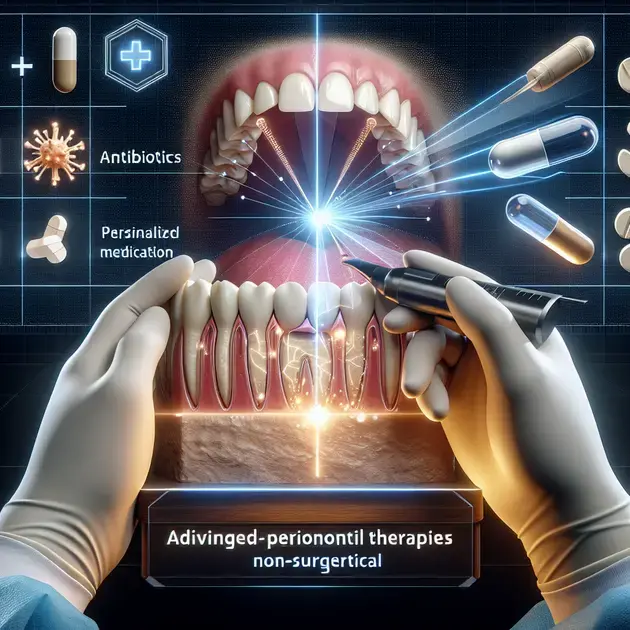When it comes to managing periodontitis, considering medication options can play a crucial role in treatment. In addition to regular dental care, medications can help control the progression of this chronic inflammatory disease that affects the gums and bone supporting the teeth.
Recent studies have shown promising results in the use of certain antibiotics and antimicrobial agents for periodontitis management. These medications can effectively target the bacteria that cause the infection, reducing inflammation and improving overall oral health. Understanding the available medication options is essential for developing a comprehensive treatment plan for periodontitis.

Understanding the Role of Medication in Periodontitis Management
Periodontitis is a serious gum infection that damages the soft tissue and destroys the bone that supports your teeth. In the management of periodontitis, medication plays a crucial role in controlling the infection and promoting healing. Understanding how medication works in periodontitis management is essential for effective treatment.
To manage periodontitis effectively with medication, it is important to follow these steps:
Step 1: Consultation with a Dental Professional
The first step is to consult with a dental professional, such as a periodontist or a dentist specializing in gum diseases. They will evaluate the extent of your periodontitis and determine the most suitable medication for your condition.
Step 2: Prescription of Antibiotics
In some cases, antibiotics may be prescribed to control the bacterial infection causing periodontitis. These antibiotics can be in the form of pills, mouth rinses, or gels, depending on the severity of the infection.
Step 3: Adherence to Medication Regimen
It is crucial to adhere to the prescribed medication regimen to ensure its effectiveness. Follow the instructions provided by your dental professional carefully and complete the full course of antibiotics, if prescribed.
Step 4: Monitoring and Follow-Up
Regular monitoring and follow-up appointments with your dental professional are essential to assess the progress of the medication treatment. Any adjustments to the medication regimen can be made based on the response to treatment.
By understanding the role of medication in periodontitis management and following a comprehensive treatment plan, you can effectively control the infection and prevent further damage to your gums and teeth.
Exploring the Benefits of Antibiotics and Antimicrobial Agents
Antibiotics and antimicrobial agents are commonly used in the treatment of periodontitis to combat the bacterial infection and promote healing. Understanding the benefits of these medications is essential for optimizing the management of periodontitis.
Here are the benefits of antibiotics and antimicrobial agents in periodontitis treatment:
Effective Bacterial Control
Antibiotics and antimicrobial agents are effective in controlling the growth of bacteria that cause periodontitis. By targeting the bacteria, these medications help reduce inflammation and promote gum healing.
Reduced Risk of Disease Progression
By using antibiotics and antimicrobial agents as part of the treatment plan, the risk of disease progression and further damage to the gums and teeth is minimized. These medications can help prevent the spread of infection.
Enhanced Healing Process
Antibiotics and antimicrobial agents aid in the healing process of the gum tissue affected by periodontitis. These medications support the regeneration of healthy gum tissue and bone, promoting overall oral health.
Combination Therapy Benefits
In some cases, antibiotics and antimicrobial agents are used in combination with other periodontal treatments, such as scaling and root planing. This combination therapy enhances the effectiveness of the overall treatment plan.
By exploring the benefits of antibiotics and antimicrobial agents in periodontitis treatment, you can make informed decisions about your medication regimen and work towards a healthy smile.
Developing a Comprehensive Treatment Plan with Medication Options
When it comes to managing periodontitis, developing a comprehensive treatment plan that includes medication options is essential for successful outcomes. By considering different medication options and tailoring the treatment plan to your specific needs, you can effectively control the infection and promote gum health.
Here is a step-by-step guide to developing a comprehensive treatment plan with medication options:
Evaluation of Periodontal Condition
The first step is to evaluate the severity of your periodontal condition through a thorough examination by a dental professional. Based on the evaluation, the most appropriate medication options will be recommended.
Discussion of Medication Options
Discuss with your dental professional the various medication options available for treating periodontitis. These options may include antibiotics, antimicrobial agents, and other medications to control infection and inflammation.
Customization of Treatment Plan
Work with your dental professional to customize a treatment plan that incorporates the chosen medication options. The treatment plan should outline the dosage, frequency, and duration of medication use.
Follow-Up and Monitoring
Regular follow-up appointments and monitoring of the treatment progress are essential to ensure the effectiveness of the medication options. Any necessary adjustments to the treatment plan can be made based on the response to medication.
By developing a comprehensive treatment plan with medication options, you can effectively manage periodontitis and improve your oral health in the long term.

Exploring Non-Surgical Treatment Options for Periodontitis
Periodontitis is a serious gum infection that damages the soft tissue and destroys the bone that supports your teeth. When it comes to non-surgical treatment options for periodontitis, there are several approaches that can help manage the condition effectively. One common non-surgical treatment is scaling and root planing, where plaque and tartar are removed from the teeth and their roots to promote healing and prevent further infection.
Another non-surgical option is the administration of antibiotics to combat the bacterial infection causing periodontitis. These antibiotics can be prescribed in pill form or as a mouth rinse to target the bacteria directly and reduce inflammation in the gums. Furthermore, laser therapy is becoming a popular non-invasive treatment for periodontitis, as it can remove infected tissue and promote the regeneration of healthy gum tissue.
In addition to these treatments, proper oral hygiene practices such as regular brushing, flossing, and using an antiseptic mouthwash can also play a crucial role in managing periodontitis. It is essential to work closely with your dental professional to determine the most suitable non-surgical treatment plan for your specific condition.
Advanced Periodontal Therapy Beyond Antibiotics
While antibiotics can be effective in treating periodontitis, advanced periodontal therapy goes beyond this approach to provide more comprehensive care for patients with severe gum disease. One advanced therapy option is guided tissue regeneration, where membranes are used to promote the growth of new bone and gum tissue in areas affected by periodontitis.
Another advanced therapy is dental implant therapy, which can be a long-term solution for patients with advanced periodontal disease who have lost teeth. Dental implants not only replace missing teeth but also help preserve the bone structure in the jaw and prevent further gum recession.
Furthermore, regenerative therapy, such as the use of growth factors or tissue engineering techniques, can help stimulate the body’s natural healing processes and promote the regeneration of healthy gum tissue. These advanced therapies require specialized training and expertise, so it is essential to seek treatment from a periodontal specialist.
Personalized Medication Strategies for Periodontitis Management
Personalized medication strategies for periodontitis management involve tailoring treatment plans to each individual patient based on their specific needs and preferences. One personalized medication approach is the use of antimicrobial mouth rinses, which can help reduce bacteria in the mouth and prevent infection in periodontal pockets.
Another personalized medication strategy is the prescription of anti-inflammatory drugs to reduce gum inflammation and promote healing. These drugs can be prescribed in various forms, such as pills, gels, or mouthwashes, depending on the patient’s condition and response to treatment.
Additionally, personalized medication strategies may include the use of locally applied antibiotics or antimicrobial agents to target specific areas of infection in the gums. By customizing medication plans to address individual patient needs, periodontal specialists can optimize treatment outcomes and improve the overall health of the gums and supporting structures.
Conclusion
Non-surgical treatment options for periodontitis offer effective ways to manage the condition and promote gum health. From scaling and root planing to the administration of antibiotics and laser therapy, there are various techniques available to combat bacterial infections and prevent further damage to the teeth and gums.
For more severe cases, advanced periodontal therapies like guided tissue regeneration, dental implant therapy, and regenerative therapy provide comprehensive care by promoting the growth of new tissue and preserving bone structure. These specialized treatments require expertise and can be long-term solutions for patients with advanced periodontal disease.
Personalized medication strategies tailored to individual patients’ needs play a crucial role in managing periodontitis effectively. By customizing treatment plans with antimicrobial mouth rinses, anti-inflammatory drugs, and locally applied antibiotics, periodontal specialists can optimize outcomes and improve overall gum health. Working closely with dental professionals is essential to determine the most suitable non-surgical or advanced treatment plan for each patient’s specific condition.



